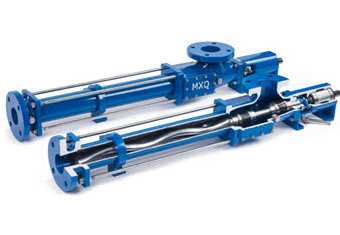Sludge and sludge dewatering are critical processes in various industries, including wastewater treatment, mining, and food processing. A sludge and sludge dewatering progressive cavity pump plays a crucial role in efficiently handling sludge and facilitating the dewatering process. In this comprehensive guide, we will explore everything you need to know about sludge, sludge dewatering, and the role of progressive cavity pumps in these processes. Additionally, we will delve into the features and benefits of Mingjie progressive cavity pumps and how they can optimize sludge handling and dewatering operations.

Understanding Sludge:
Sludge refers to the semi-solid residual material left behind after the treatment of wastewater, industrial effluent, or other liquid substances. It typically contains a mixture of water, organic and inorganic solids, pathogens, and other contaminants. Sludge can vary widely in composition depending on the source and treatment process.
Types of Sludge:
- Primary Sludge: Generated during the primary treatment stage of wastewater treatment, primary sludge consists of solid particles that settle out during the sedimentation process.
- Secondary Sludge: Also known as activated sludge, secondary sludge is produced during the biological treatment of wastewater. It contains microorganisms that help break down organic matter.
- Tertiary Sludge: Tertiary sludge is generated from additional treatment processes, such as chemical precipitation or filtration, to further remove impurities from wastewater.
Sludge Dewatering: Sludge dewatering is the process of removing excess water from sludge to reduce its volume and facilitate disposal or reuse. Dewatering is essential for minimizing transportation costs, reducing environmental impact, and complying with regulations. Various methods are used for sludge dewatering, including:
- Mechanical Dewatering: Utilizes equipment such as filter presses, belt filter presses, and centrifuges to mechanically squeeze or spin out water from sludge.
- Thermal Dewatering: Involves applying heat to sludge to evaporate water, typically using technologies like drying beds or thermal dryers.
- Chemical Dewatering: Adds chemicals to sludge to enhance water separation, such as flocculants or coagulants.
Progressive Cavity Pumps for Sludge Handling: Progressive cavity pumps (PCPs) are positive displacement pumps that are highly efficient in handling viscous and abrasive fluids like sludge. These pumps consist of a helical rotor and a stator with a matching cavity. As the rotor rotates within the stator, cavities are formed and progress along the length of the pump, conveying fluid from the inlet to the outlet.
Benefits of Progressive Cavity Pumps for Sludge Handling:
- Gentle Handling: PCPs provide gentle and non-pulsating fluid flow, minimizing shear and agitation that could degrade sensitive sludge components.
- Viscosity Handling: PCPs can handle high-viscosity fluids, making them ideal for pumping thick sludge with ease.
- Solids Handling: With their large cavities and low internal velocities, PCPs can effectively handle slurries and fluids containing high concentrations of solids.
- Self-Priming: PCPs are self-priming pumps, capable of automatically evacuating air and fluid from the suction line, reducing the risk of cavitation.
- Reversible Operation: Some PCPs offer reversible operation, allowing for bi-directional pumping and enhanced flexibility in sludge transfer applications.
Mingjie Progressive Cavity Pumps for Sludge Dewatering: Mingjie is a leading manufacturer of progressive cavity pumps known for their reliability, performance, and durability. Mingjie progressive cavity pumps are specifically designed for sludge handling and dewatering applications, offering the following features:
- Robust Construction: Constructed from high-quality materials such as stainless steel and cast iron, Mingjie pumps are built to withstand the harsh operating conditions of sludge dewatering.
- Flexible Configurations: Mingjie offers a wide range of pump configurations, including standard pumps, compact pumps, and customized solutions tailored to meet specific application requirements.
- Advanced Sealing Technology: Mingjie pumps feature advanced sealing mechanisms to prevent leakage and ensure long-term reliability, even in abrasive sludge environments.
- Easy Maintenance: Designed for easy access and maintenance, Mingjie pumps are equipped with quick-disconnect features and interchangeable components, minimizing downtime and reducing maintenance costs.
- Comprehensive Support: Mingjie provides comprehensive technical support, including installation assistance, training, and aftermarket services to ensure optimal pump performance and customer satisfaction.
Conclusion: Sludge and sludge dewatering are critical processes in various industries, requiring efficient and reliable pumping solutions. Progressive cavity pumps play a vital role in handling sludge and facilitating dewatering operations, offering numerous benefits such as gentle handling, viscosity handling, and solids handling capabilities. Mingjie progressive cavity pumps stand out as top-tier solutions for sludge dewatering, providing robust construction, flexible configurations, advanced sealing technology, easy maintenance, and comprehensive support. With Mingjie pumps, industries can optimize their sludge handling and dewatering processes, ensuring efficient operation, environmental compliance, and cost-effective solutions.







